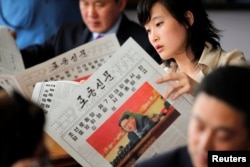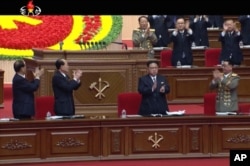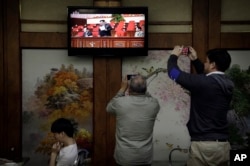North Korea’s treatment of international journalists in the country is undermining the carefully constructed image of the Kim Jong Un government being presented at the party congress, now under way in Pyongyang.
North Korea expelled a team of BBC journalists Monday, apparently because officials were unhappy with their reports.
Rupert Wingfield-Hayes, BBC’s Tokyo correspondent, along with producer Maria Byrne and cameraman Matthew Goddard were detained Friday as they were about to leave North Korea. Wingfield-Hayes was interrogated for eight hours.
The BBC team was in North Korea ahead of the Workers Party Congress accompanying a delegation of Nobel prize laureates conducting a research trip.
The team also joined 130 invited foreign journalists to cover the beginning of North Korea’s Workers' Party Congress, the biggest political convention held in North Korea in generations.
The journalists, however, have been kept far away from thousands of party officials gathered at the event and government minders have closely managed their movements.
Nuclear state
The party congress itself has tried to show unity and support for North Korean leader Kim Jong Un’s "Byongjin" policy of jointly pushing forward economic development and nuclear armament.
On Monday, the congress announced a new title for the North Korean leader, party chairman.
In his address to the congress over the weekend, Kim - dressed in a Western business suit - received extended applause for his speech, but analysts say he offered no serious proposals for reducing international tension over North Korea’s nuclear program.
The United Nations imposed harsh new economic sanctions on North Korea in March for its last nuclear test and rocket launch earlier this year.
Kim declared his country a nuclear state, but said he would refrain from using nuclear weapons unless the North’s sovereignty is violated. Kim also said he is willing to normalize ties with states that had been hostile towards it.
South Korea’s Defense Ministry spokesman Moon Sang-kyun on Monday rejected Kim’s position and outreach.
“It is a consistent position of us and the international community that we do not recognize North Korea as a nuclear state. Our government will continuously put forth efforts to make North Korea give up its nuclear power through strong sanctions and pressure,” he said.
Bong Young-shik, a national security analyst with the Asan Institute for Policy Studies in Seoul is also dubious whether Kim Jong Un was actually making a serious proposal to engage in talks to reduce inter-Korean tensions.
“I think that proposal needs to be weighed to see if it carries any significance or is it just cover for the sake of proposing to the world that the North Korean regime might be interested in a reduction of tension,” said Bong.
The international community, including North Korean allies China and Russia, want the Kim Jong Un government to return to talks to dismantle its nuclear program in return for economic assistance and security guarantees.
In his speech Kim Jong Un again refused to give up his nuclear program, but promised to “fulfill its obligation for non-proliferation and strive for global denuclearization.”
Kim Yong-hyun, a North Korean studies professor at Dongguk University in Seoul said the North Korean leader made clear he is not willing to compromise.
“North Korea is trying to get a complete recognition as a nuclear state, and in this process, North Korea is also trying to approach the U.S. and international community on the nuclear issue,” he said.
Economy
Kim’s economic plan offered few specific details but praised the country’s socialist system and promised greater agriculture yields, factory production and coal output.
South Korea's central bank said last year the North's economy grew by one percent in 2014.
Much of the North’s economic activity, however, is happening in unofficial private markets that have been growing steadily in recent years.
Professor Andrei Lankov, a North Korea analyst with Kookmin University, said the fact the North Korean leader did not mention the privatization of the economy is itself a kind of tacit approval.
“It can be seen as a sign that he’s going to continue with his current economic policy, which is essentially benign neglect of the fast-growing market forces within North Korea, and this is good,” Lankov said.
The North’s economy is expected to suffer under the new U.N. sanctions that restrict the country’s lucrative mineral trade and bans most bank transactions.
The ruling party congress, in its fourth day, is the first to be held in 36 years and is happening amid speculation that North Korea will soon conduct its fifth nuclear test.
Youmi Kim in Seoul contributed to this report.








